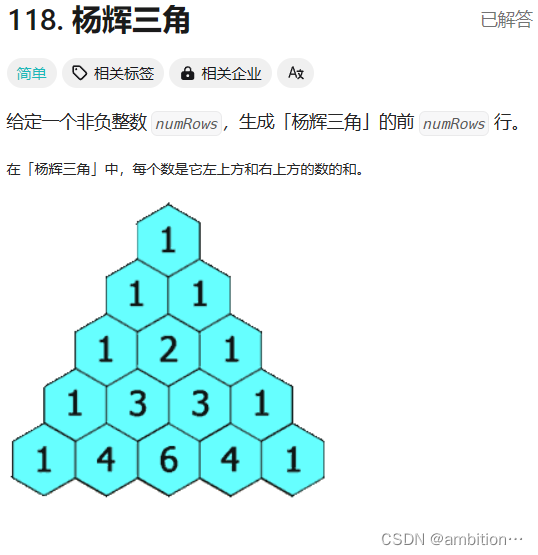数据结构之顺序表
发布时间:2024年01月18日
目录
一、概念
是一段物理地址连续存储元素的线性结构,采用数组存储,实现了List接口。
二、构造方法

无参构造时,第一次add时会默认容量为10.
三、常见操作

四、扩容机制
ArrayList是一个动态类型的顺序表,在插入元素过程中会自动扩容。以下是扩容源代码:

会先按照原来容量的1.5倍扩容,若用户所需容量已经大于1.5倍扩容结果,则以用户指定大小扩容。若扩容后的空间大于MAX_ARRAY_SIZE,则重新计算容量大小。使用Arrays的copyOf方法扩容。
五、ArrayList的具体使用
1、简单洗牌算法
实现买牌(展示牌)、洗牌、三人轮流接五回牌
import java.util.ArrayList;
import java.util.List;
import java.util.Random;
class card{
private String flower; //牌的花色
private int number; // 牌的数字
public String getFlower() {
return flower;
}
public void setFlower(String flower) {
this.flower = flower;
}
public int getNumber() {
return number;
}
public void setNumber(int number) {
this.number = number;
}
public card(String flower,int number){
this.flower=flower;
this.number=number;
}
@Override
public String toString() {
return flower+":"+number;
}
}
class cardDo {
public static final String[] flowers=new String[]{"?","?","?","?"};
//买牌
public List<card> buyCards(){
List<card> cardList=new ArrayList<>();
for (int i=0;i<4;i++){
for(int j=0;j<13;j++){
card temp=new card(flowers[i],j+1);
cardList.add(temp);
}
}
return cardList;
}
//洗牌
public List<card> washCards(List<card> cardList){
Random random=new Random();
for(int i=cardList.size()-1;i>0;i--){
int index=random.nextInt(i);
swap(cardList,i,index);
}
return cardList;
}
public void swap(List<card> cardList,int index1,int index2){
card temp=cardList.get(index1);
cardList.set(index1,cardList.get(index2));
cardList.set(index2,temp);
}
//接牌
public void getCards(List<card> cardList){
List<List<card>> hands=new ArrayList<>();
List<card> hand1=new ArrayList<>();
List<card> hand2=new ArrayList<>();
List<card> hand3=new ArrayList<>();
hands.add(hand1);
hands.add(hand2);
hands.add(hand3);
for(int i=0;i<5;i++){
for(int j=0;j<3;j++){
card temp=cardList.remove(0);
hands.get(j).add(temp);
}
}
System.out.print("第一个人接的牌如下:");
System.out.println(hand1); //默认调用toString
System.out.print("第二个人接的牌如下:");
System.out.println(hand2);
System.out.print("第三个人接的牌如下:");
System.out.println(hand3);
System.out.print("剩下的牌如下:");
System.out.println(cardList);
}
}
public class test {
public static void main(String[] args) {
cardDo carddo=new cardDo();
System.out.println("买的牌如下:");
List<card> cards=carddo.buyCards();
System.out.println(cards);
System.out.println("洗的牌如下:");
List<card> newCards=carddo.washCards(cards);
System.out.println(newCards);
carddo.getCards(newCards);
}
}
2、杨辉三角

class Solution {
public List<List<Integer>> generate(int numRows) {
List<List<Integer>> numbers=new ArrayList<>();
List<Integer> number1=new ArrayList<>();
number1.add(1);
numbers.add(number1);
if(numRows==1) return numbers;
for(int i=1;i<numRows;i++){
List<Integer> number=new ArrayList<>();
number.add(1);
for(int j=1;j<i;j++){
number.add(numbers.get(i-1).get(j)+numbers.get(i-1).get(j-1));
}
number.add(1);
numbers.add(number);
}
return numbers;
}
}
文章来源:https://blog.csdn.net/m0_69468924/article/details/135662700
本文来自互联网用户投稿,该文观点仅代表作者本人,不代表本站立场。本站仅提供信息存储空间服务,不拥有所有权,不承担相关法律责任。 如若内容造成侵权/违法违规/事实不符,请联系我的编程经验分享网邮箱:chenni525@qq.com进行投诉反馈,一经查实,立即删除!
本文来自互联网用户投稿,该文观点仅代表作者本人,不代表本站立场。本站仅提供信息存储空间服务,不拥有所有权,不承担相关法律责任。 如若内容造成侵权/违法违规/事实不符,请联系我的编程经验分享网邮箱:chenni525@qq.com进行投诉反馈,一经查实,立即删除!
